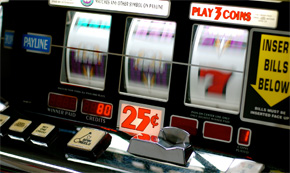Sides Lining Up On Ending Dog Racing, Allowing Slots
January 27, 2017
Both sides of the issue gave a House gambling panel dire warnings Thursday as lawmakers consider allowing Florida’s pari-mutuel operators to do away with horse and dog racing or jai alai games while maintaining other activities like cardrooms or slots.
The House Tourism and Gaming Control Subcommittee heard from the thoroughbred industry, a dog-track operator, a greyhound advocate and the head of an anti-gambling expansion group as lawmakers again gear up to consider sweeping legislation that could alter Florida’s gambling landscape.
 The House meeting came a day after a Senate panel unanimously approved a leadership-backed plan that would widely expand slot machine gambling in the state and allow all pari-mutuels but thoroughbred tracks to do away with racing or jai alai games while keeping other gambling activities, a process known as “decoupling.”
The House meeting came a day after a Senate panel unanimously approved a leadership-backed plan that would widely expand slot machine gambling in the state and allow all pari-mutuels but thoroughbred tracks to do away with racing or jai alai games while keeping other gambling activities, a process known as “decoupling.”
Saying that greyhound racing is a dying sport, dog-track operators have urged lawmakers to do away with race requirements. The greyhound advocacy group Grey2K also has pushed Florida — one of just six states that currently allow dog racing — to put an end to the sport.
Over the past decade, pari-mutuel wagering has declined nearly 50 percent, generating more than $30 million in revenue for the state in 2006 and less than $12 million last year, according to an annual report issued by the Department of Business and Professional Regulation.
“We have a product that the audience is not interested in. Frankly, if it wasn’t for the addition of poker, a lot of the pari-mutuel operators would be closed,” said Dan Adkins, vice president of Hartman & Tyner, which owns Mardi Gras Gaming in Hallandale Beach.
Florida’s greyhound tracks got their start nearly a century ago, Adkins said, “but we still need to have products that people are interested in or we can’t survive.”
Adkins’ facility is among pari-mutuels in Broward and Miami-Dade counties that are allowed to have slots. The Senate plan (SB ![]() would allow “racinos” like Mardi Gras to also operate 25 blackjack tables.
would allow “racinos” like Mardi Gras to also operate 25 blackjack tables.
Cary Thiel, executive director of Grey2K USA, maintained that dog racing is not only a thing of the past but is costing the state money and has led to the cruel treatment of racing animals by some operators who use the greyhounds as a means to operate more lucrative poker rooms.
“This industry has found itself out of touch with where mainstream values are regarding the humane treatment of animals,” Thiel said, pledging that his group would continue its crusade to end dog racing until the activity is eliminated.
Lonny Powell, CEO and executive vice president of the Florida Thoroughbred Breeders’ and Owners’ Association, cautioned that eliminating thoroughbred racing — now taking place only at Gulfstream Park and Tampa Bay Downs — would decimate an industry that generates billions of dollars in revenue and thousands of jobs.
Lawmakers’ discussion of decoupling over the past few years has injected an element of fear into the state’s horse industry, Powell said.
“It’s like an anvil hanging over your head every day with a real thin rope,” he said.
Decoupling all horse breeds — not contemplated in the Senate proposal — would have a “nuclear” effect, Powell warned.
“The industry will quickly dissipate. It would be cataclysmic for the second-largest thoroughbred breeding industry in North America,” he said.
Powell also called slot machines pari-mutuel racing’s biggest threat.
“Slot machines, once they’re out, they clobber all forms of gambling,” especially due to “their ability to offer quick, mindless action,” he said.
The Senate bill would not decouple thoroughbreds, but would require a portion of the revenue from slot machines to go toward purse pools for horse races, something that Adkins characterized as an unfair “subsidization” of his competitors.
A former gambling regulator once characterized Florida’s highly competitive pari-mutuel industry as one in which operators “care more about what the other guy doesn’t get” than what the operator can obtain.
Adkins reflected that the gambling industry in Florida, with more pari-mutuel operators than any other state, can sometimes be its own worst enemy.
“We’re dysfunctional. The industry needs to get its act together, literally,” he said.
Lawmakers are considering the gambling legislation as the state renegotiates a 2010 agreement, called a compact, with the Seminole Tribe. A portion of the compact that gave the tribe the exclusive rights to operate “banked” card games, such as blackjack, expired last summer.
Despite the expiration, a federal judge ruled in November that the Seminoles could continue to offer blackjack because the state had breached the agreement by permitting controversial “designated player” games at pari-mutuel cardrooms.
Meanwhile, the Florida Supreme Court is poised to rule on a case focused on whether pari-mutuels in counties where voters have approved slot machines can expand their operations without the express approval of the Legislature.
John Sowinski, president of the group No Casinos, said Thursday that lawmakers shouldn’t permit pari-mutuels to quit conducting the activities that allowed them to get licenses for other gaming operations, even if they are more lucrative.
For example, Sowinski said, his father once owned a television repair shop.
“But nobody offered me the exclusive license to sell Apple computers because my dad owned a TV store,” he said.
by Dara Kam, The News Service of Florida



Comments